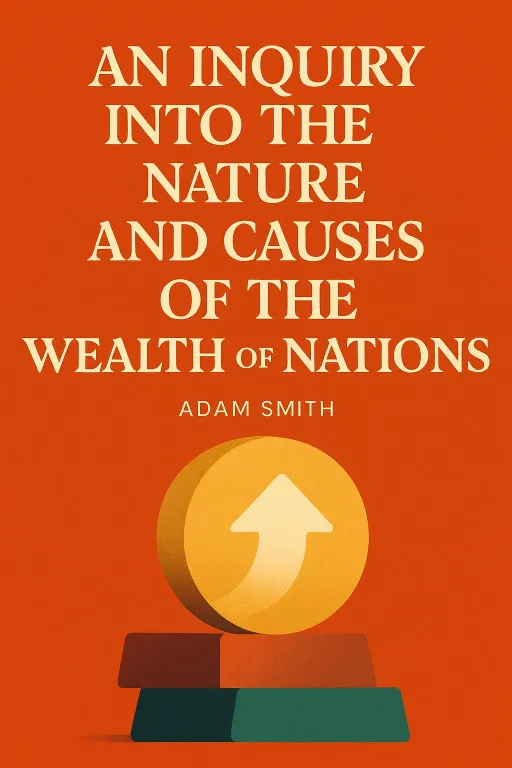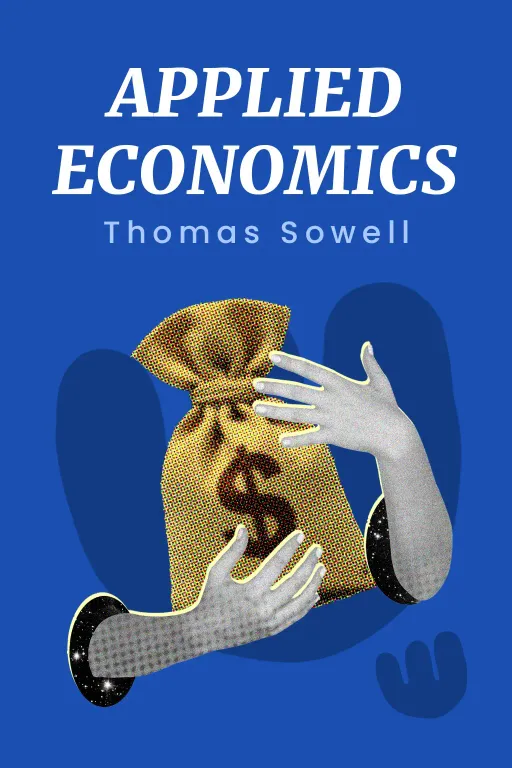
An Inquiry Into the Nature and Causes of the Wealth of Nations
10 minIntroduction
Narrator: Imagine a small, unremarkable workshop in the 18th century. Inside, a single artisan is tasked with making pins. He must draw out the wire, straighten it, cut it, point it, grind the top, make the head, attach it, and finally, package the finished product. Working diligently all day, this skilled individual might, if he’s lucky, produce twenty pins. But what if the work was divided? What if one person’s only job was to draw the wire, another’s was to cut it, and a third’s was to sharpen the point? In this scenario, Adam Smith observed that ten workers, each a specialist in a tiny part of the process, could produce an astonishing forty-eight thousand pins in a single day.
This powerful observation, a revelation in its time, forms the very foundation of modern economics. It comes from Adam Smith's monumental 1776 work, An Inquiry Into the Nature and Causes of the Wealth of Nations. This book is not just a dusty historical text; it’s a foundational blueprint that explains how prosperity is created, how markets function, and what drives the economic engine of the world.
The Engine of Prosperity is Specialization
Key Insight 1
Narrator: The core argument of The Wealth of Nations begins with a simple but revolutionary concept: the division of labor. Smith posited that the greatest improvements in the productive power of human labor were the effects of specialization. The pin factory was his defining example. By breaking down the complex process of making a pin into about eighteen distinct, simple operations, each performed by a different worker, productivity didn't just increase—it exploded. Workers became incredibly dexterous at their single task, no time was wasted switching between different jobs, and the repetitive nature of the work even encouraged the invention of machines to make the tasks faster.
But what drives this system? Smith argued it wasn't some grand, benevolent plan. It arises from a fundamental human propensity to "truck, barter, and exchange." He famously wrote, "It is not from the benevolence of the butcher, the brewer, or the baker, that we expect our dinner, but from their regard to their own interest." In other words, the baker bakes bread not because he wants to feed the community, but because he wants to earn a living. By pursuing his own self-interest, he provides a product that others need. This network of self-interested individuals, each specializing in what they do best and trading with others, creates a system of cooperation that is far more effective than any top-down command.
Markets and Capital are the Fuel
Key Insight 2
Narrator: While the division of labor is the engine of prosperity, Smith identified two critical types of fuel required to make it run: the size of the market and the accumulation of capital.
First, specialization is only possible if there’s a large enough market to absorb the massive increase in production. Smith illustrated this by comparing the Scottish Highlands to London. In a remote, sparsely populated area of the Highlands, a person might have to be their own carpenter, blacksmith, and tanner, because there isn't enough demand to support each as a full-time, specialized profession. In a bustling city like London, however, the market is vast. Not only can there be a full-time carpenter, but the work itself can be subdivided into cabinet makers, joiners, carvers, and wheelwrights, each a master of their specific craft. The larger the market, the greater the potential for specialization and, therefore, the greater the potential for wealth.
Second, this system requires capital, or what Smith called "stock." A specialized worker, like a weaver, cannot simply focus on his loom all day if he has no food to eat or materials to work with. Before he can even begin, there must be a pre-accumulated stock of resources—food to sustain him, yarn to weave, and a loom to work on—that will support him until his cloth is finished and sold. This accumulation of capital, driven by savings and investment, is what enables the division of labor to take hold and expand, allowing more and more people to become specialized producers.
The Invisible Hand Guides, But Governments Distort
Key Insight 3
Narrator: If everyone is pursuing their own self-interest, how does this lead to a well-functioning society instead of chaos? Smith’s answer is one of the most famous concepts in economics: the "invisible hand." He argued that when an individual invests their capital in the way they believe will be most profitable, they are "led by an invisible hand to promote an end which was no part of his intention." By seeking their own gain, they inadvertently contribute to the public good by creating products, jobs, and overall economic activity more effectively than if they were trying to help society directly.
This stood in stark contrast to the dominant economic theory of his time, Mercantilism. Mercantilists believed a nation's wealth was measured by its hoard of gold and silver. To maximize this hoard, governments imposed heavy-handed policies like restricting imports, subsidizing exports, and granting monopolies to favored companies. Smith argued this was a profound mistake. A nation's true wealth, he contended, is not its gold, but the total sum of goods and services its people can produce and consume—its annual produce.
Government interventions, like the complex system of bounties on Scottish herring fisheries, only distorted this natural, efficient allocation of resources. By subsidizing one industry, the government was pulling capital and labor away from other, potentially more productive, areas where it would have naturally flowed. The invisible hand of the market, Smith argued, was a far better guide for creating national wealth than the clumsy, visible hand of the state.
The Proper Role of Government is as a Referee, Not a Player
Key Insight 4
Narrator: While Smith was a fierce critic of government meddling in the market, he was not an anarchist. He believed the state had a crucial, though limited, role to play. He outlined three fundamental duties of the sovereign.
First, the duty of defense: protecting society from foreign invasion. This requires a military force, an expense that is necessary for the security upon which all commerce depends. Second, the duty of justice: establishing a system of laws and courts to protect every citizen from the injustice or oppression of other citizens. Without reliable property rights and contract enforcement, the trust needed for a market economy to function would collapse.
Third, the duty of erecting and maintaining certain public works and institutions. Smith recognized that there were some projects that were essential for a functioning society but would never be profitable for an individual or small group to undertake. This included infrastructure like roads, bridges, and canals that facilitate commerce, as well as institutions like public education to combat the mind-numbing effects that the division of labor could have on a worker. In essence, the government’s role was to be the referee—setting the rules, enforcing them fairly, and providing the basic infrastructure—but not to be a player on the field, picking winners and losers in the economy.
Conclusion
Narrator: The single most important takeaway from The Wealth of Nations is that a country's prosperity is not found in its king's treasury or its stockpiles of gold. The true wealth of a nation is the productive capacity of its people, a capacity that is unleashed when individuals are free to specialize, trade, and pursue their own interests within a system of justice and fair rules. It’s a radical shift in perspective: from seeing wealth as a fixed pie to be fought over, to seeing it as an ever-expanding resource created by human ingenuity and cooperation.
Over 250 years later, Adam Smith's ideas remain incredibly relevant. The central tension he identified—between the power of the free market to generate wealth and the role of government to ensure fairness and stability—is still the defining economic debate of our time. His work challenges us to ask a question that is as vital today as it was in 1776: How do we best balance the invisible hand of the market with the visible hand of the state to create a society that is both prosperous and just?









